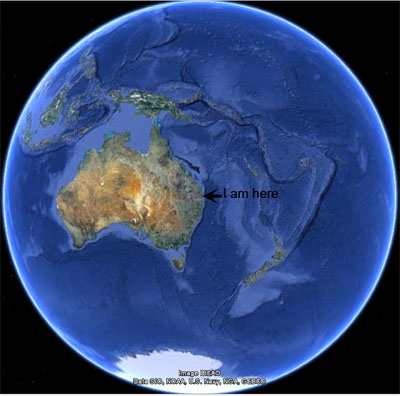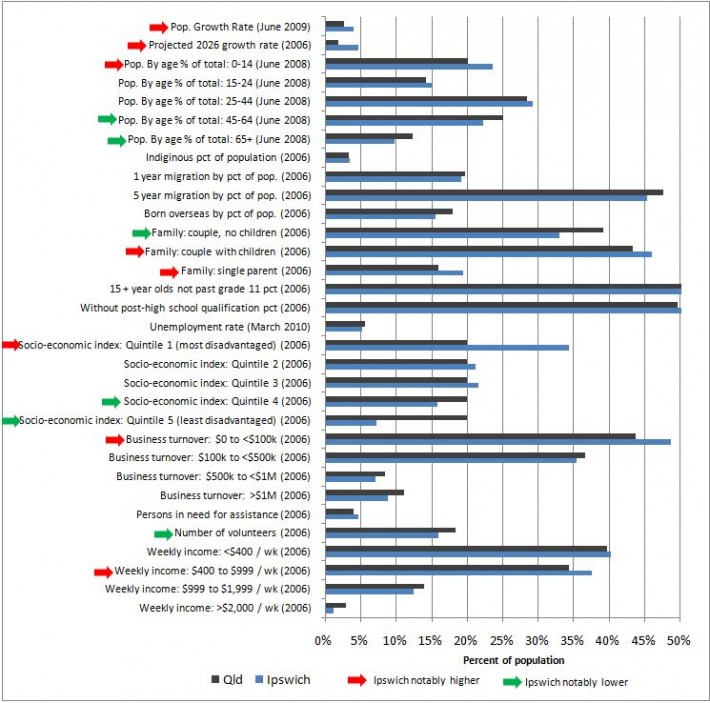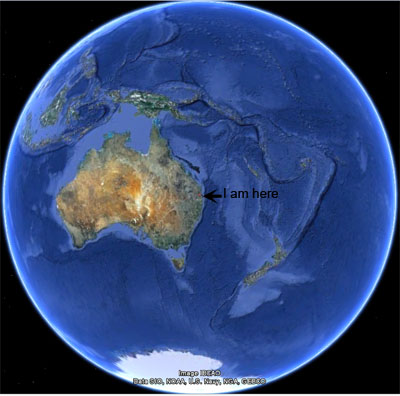I live in Ipswich, Queensland: What statistics say about capacity, volunteering, opportunity, growth, and potential
I live in Ipswich, Queensland, a small city of 162,000 people located about a 40-minute drive west of Brisbane. Theresa and I moved up from Bendigo, Victoria in 2006 in a search for a combination of warm weather and affordable housing. We found both, and more.

Ipswich shares a reputation of being a bit rough around the edges held by many western areas feeding a large metropolitan area. I come from a perspective of having lived in several locations including around Seattle, Vancouver, Connecticut, San Diego, San Antonio, Melbourne, and the aforementioned Bendigo. I can honestly say that the experience of listening to live jazz on the banks of the River Heart Parklands rivals any I have had at the other places I called home. As with any of them, there are pockets of opportunities and challenges.
Both potentials were highlighted in the recent floods, as the community banded together to support widespread devastation. Having been personally affected, we enter our fifth year in the community with the prospect of investing further and hanging onto our property for a period longer than expected to recover the land value. This provides an opportunity to look around and gain an appreciation for the community we have become a part of.
The statistics

Ipswich‘s 4% population growth rate is far exceeding the Queensland average of 2.6%. The growth rate correlates with opportunities for employment, with the current unemployment rate of 5.2% below the 5.6% State average. This population is younger than the State average, with a substantially stronger representation in each of the 0 to 14, 15 to 24, and 25 to 44 age brackets.
This growth is occurring in a community characterised as being low-socioeconomic (34% in the lowest quintile) as compared to the rest of Queensland (20%). The usual community structural impact areas of focus such as single-parent family units, people with disabilities in need of assistance, and indigenous populations are only marginally higher than the State average. Indicators that are notably higher than the rest of Queensland include businesses with turnover less than $100k, weekly income less than $1000, and individuals without post-high school qualifications or 15 year olds past grade 11.
The data demonstrates that Ipswich has not suffered disproportionately from common issues of disadvantaged people groups. What is evident is low-earning businesses resulting in lower than average wages and attracting as well as producing lower-education groups. This presents exciting opportunities to work with existing people groups to increase capacity at the individual and organisational level and support and enhance the existing structure as it accomodates the growth. The historical lower than average volunteering rate highlights where local volunteering organisations can be positioned to take advantage of this opportunity.
Opportunity where you live – let the numbers guide you
It is not difficult to find opportunities in the numbers. Personally, I am excited about the potential presented, and help as I am able as a board member on the start-up Volunteering Ipswich. Other areas available for personal investment by others include working with small businesses to increase capacity in organisations and their leaders and developing the community profile to continue to attract larger corportions.
We have a choice in the communities we engage with: we can exist or we can participate. As much as anyone, I respect the challenge of balancing work, play, and family networks within a wider context of “being” and “doing” within community. We can strive for our efforts in each area to create synergies between other areas where possible.
Statistics and census data are fairly easy to come by in this digital age. What do your statistics say about where you live? More importantly, what do they say about what you can do?


Hi Theresa,
What an excellent piece of positive writing. I was looking into thoughts about Ipswich’ reputation and came across this. We are having our Ipswich City Prayer meeting with a few people tonight, and part of our aim is to seek God about declarations to make for our city – good, God- truths, rather than the bagging that happens. I don’t suppose you are planning to come, but if you feel so inclined, we would love to see you there. I will be printing this out to share with those who come.
Blessings,
Ruth Booij
Hi, what a great article.
I’ve lived in Ipswich most of my life, & I’ve run several different businesses in & around the area. There is a definite stigma attached to the city, but like anywhere, it has positives & negatives. Ipswich is rich with history & has some beautiful areas.
There may be some socio-economic issues, however these have never been roadblocks in any of my business ventures, & I’ve found most people to be nice, regardless of their income level.
The 2011 floods hit everyone hard, but a few years on, I think everyone has banded together in their communities & rebuilt bigger & better.
I really like you’re thought provoking article about what we can do within our local communities, & I hope plenty of locals read this & have a good think about their roles within their neighbourhood.